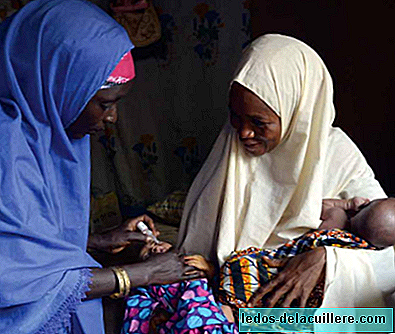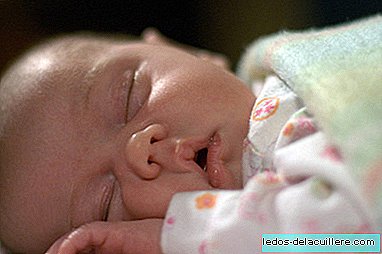
The birth of a baby should always be a reason for joy and a song to life but, unfortunately, not all children have the same chance of survival depending on the country in which they were born.
UNICEF has just published the report "Every life counts" that analyzes the mortality figures of newborns worldwide, and warns that these continue to be very high. Approximately, it is estimated that 2.6 million babies worldwide die before their first month of life, and a million of them do it the same day they are born. Undoubtedly terrible figures that should capture all our attention and reflection.
Born and died with less than a month of life
In the last 25 years, the death rate among children under five has been reduced to more than half, which is a breakthrough in UNICEF's struggle to improve the living conditions of children around the world.
But nevertheless, figures with children under one month remain alarmingly high, and every year 2.6 million babies die before their first month of life, of which one million die the same day they are born.
Unicef, through its campaign "Every life counts" reports that more than 80% of newborns who died in 2016 did so for Causes that can be avoided and treated:
And, as reported by the NGO itself, with quality and affordable health care, adequate nutrition and clean water could save the lives of millions of babies every year."These children do not die because there are no tools to save them. The cause of more than 80% of newborn deaths lies in three factors that can be avoided and treated: complications arising during childbirth or derived from a premature delivery, and some infections like sepsis, meningitis and pneumonia "
 Via UNICEF
Via UNICEF But these terrible figures also add those of others 2.6 million babies born dead, even though most of them were alive when labor began.
UNICEF believes that these figures could be drastically reduced improving women's delivery care, as well as the quality of their care. Not surprisingly, in countries like Somalia (one of those with the highest mortality rates in newborns) there is only one doctor, nurse or midwife for every 10,000 people.
How could the survival figures be improved?
From UNICEF they warn that a medicine or an intervention will not improve this dramatic situation, and ask for help to governments and institutions to end the avoidable deaths of newborns.
In addition, they consider it important to improve these four basic pillars:
- On the one hand, ensure clean health facilities with adequate hygienic measures so that mothers can give birth to their babies with the best guarantees.
This would include a constant supply of water and electricity, and basic things like soap and hand sanitizer, something that unfortunately does not have 35% of the health facilities in 54 countries.
- On the other hand, it is essential that the staff who care for mothers during their pregnancy and childbirth, and who take care of newborns, are qualified and trained in the necessary skills for Save lives. In addition, it is essential that they know the benefits of breastfeeding and support it, as well as vaccination of the newborn.
Similarly, in the case of sick or premature babies, UNICEF reports the importance of professionals knowing and promoting the kangaroo method, which would help reduce risks significantly which these babies face.

Are also needed medicines, products and equipment to treat mothers and their babies, and that would range from such basic things as blankets, thermometers or antiseptics, to respirators, oxygen equipment or phototherapy machines.
And we must not forget the importance of empower adolescents and women so that they demand a dignified and respectful treatment during their pregnancy and childbirth, since it is shown that in countries where the mortality rate of newborns is higher, women have a level of education, participation in political life and economic empowerment much Less than men.
The countries where it is less safe to be born
The risk of a newborn dying varies greatly depending on the country in which it is born. In this sense, the three countries with the highest risks are Pakistan, with 46 deaths in the first month of life for every 1,000 newborns, Central African Republic with 42 and Agfanistan with 40.
Of the ten countries with higher mortality rates of newborns, eight of them are in sub-Saharan Africa and two in South Asia. And although they are not among the top ten, there are also other countries in Latin America and the Caribbean, such as the Dominican Republic, with a high death rate during the first month of life.
 Via UNICEF
Via UNICEF On the opposite end, that is the safest countries to be born, there would be Japan, Iceland and Singapore, with 1 deceased in the first month of life for every 1,000 babies born. These countries have robust health systems, abundant and qualified health personnel, and quality and universal medical assistance.
 Via UNICEF
Via UNICEF We observe that the countries with more poverty and military conflicts are those that have worse newborn survival rates, although within the same country there are also disparities depending on the education and purchasing power of each family.
Thus, babies whose mothers have not received an education have almost double the risk of dying after birth than those whose mothers have completed at least secondary education. And babies born from poor families are 40 percent more likely to die, compared to those born in less poor families within the same country.
In UNICEF #CadaVidaCuenta!
A shared publication of UNICEF Spanish Committee (@unicef_en) on Feb 20, 2018 at 1:11 PST
But behind all these cold data and statistics are millions of newborns, babies of few days of life, and mothers who mourn the loss or suffering of a child. And to me, as a mother my soul breaks.
Because every life counts, and all babies born should have the same chance of survival and growth, regardless of their place of birth. Let's help UNICEF through its campaign to improve the lives of millions of newborns around the world. You join?
Unicef Photos
Via UNICEF
In Babies and More Breastfeeding could save the lives of more than 800,000 children and 20,000 women a year, Vaccines save the lives of three million children every year, Dad can also do the Kangaroo Method, Challenges with children in Latin America and the Caribbean: there is still much to do












